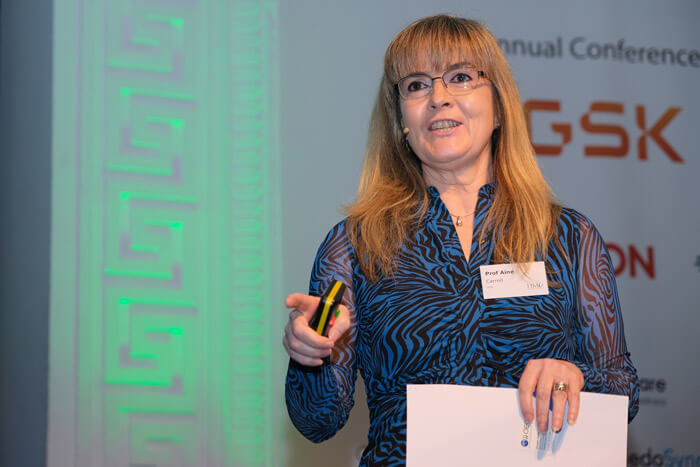
The journey towards integrated care was not just a concept; it was a transformational path to a brighter and healthier future for everyone, and what was needed was to accelerate progress, Prof. Áine Carroll Chair International Foundation for Integrated Care (IFIC), Professor of Healthcare Integration and Improvement UCD and Consultant in Rehabilitation Medicine, National Rehabilitation Hospital, told the Conference.
“We have the power to shape the healthcare landscape, nurturing an enabling system where collaboration, compassion, and innovation converge to provide the best possible care for all. As we stand at the crossroads of healthcare evolution, let us remain inspired by the boundless potential of integrated care,“ she said.
“What is needed to accelerate progress is shared values and vision, population health and local context, people as partners in care, resilient communities and new alliances, workforce capacity and capability, system wide governance and leadership, digital solutions, aligned payment systems and transparency of progress, results and impact.”
“At the International Foundation, we take a broad view of what is meant by integrated care. It means different things to different people in different contexts. We have seen the term adopted globally over the last decade alongside such terms as person-centred care, population health management, case management, care co-ordination, chronic care and long term condition management, to name but a few…
“The IFC’s vision is for a world where everybody experiences joined-up, easy to navigate care that addresses the outcomes that matters to them in their lives and the communities in which they live. Its mission is to inspire, influence and facilitate the adoption of community-centred integrated care in policy and practice around the world that is inclusive. The IFC does not operate alone, but in collaboration with partners, internationally, nationally and regionally.”
Prof. Carroll said the International Foundation for Integrated Care was founded by three Dutch Universities. It was not an inclusive member organisation, it was an inclusive movement for change that shared a common purpose.
It sought to lead and advance the science of integrated care, generate and share knowledge and skills about the impact of policy making, generate and share skills about the practice of integrated care in real world settings and its impact on people and communities, act as an international collaboration platform and grow the movement.
“At the Foundation, we take a broad view of what is meant by integrated care. It means different things to different people in different contexts. We have seen the term adopted globally over the last decade, alongside such terms as person-centred care, population health management, case management, care co-ordination, chronic care and long term condition management.”
Prof. Carroll said Integrated Care had often been defined conceptually by the problems it aimed to solve. These included fragmentation of health care and support services, services which were not designed correctly and were unsuited for the needs of a population living longer with multiple chronic conditions and under-resourced services such as primary care that was narrow in scope and medically-driven.
“IFIC sees a continuum of definitions of integrated care. At the other end of the continuum there is a broad definition of integrated care that addresses fragmentation beyond the boundaries of the formal health and care system, understanding wellbeing in terms of quality of life and referring to people’s capacity to live healthy, meaningful, creative and fulfilling lives.
“IFIC recognises that systems need to adopt a definition at a point in time that meets the needs of their community, recognises the wider context in which they sit. While this will change over time, the guiding principles of integrated care remain the same – person and community centred, co-ordinated and with continuity”
She said that what worked in integrated care was highly, context sensitive. IFIC focused on collating knowledge on what worked in integrated care practice in many different contexts through its knowledge tree, events, IJIC and network of Country Hubs, Special Interest Groups and Emerging Researchers and Professionals in Integrated Care (ERPIC) network.
The EU Commission had funded a project to understand the state of integrated care across Europe in 2016-2018. The team coordinated a network of national-level researchers to map integrated care initiatives, policies and strategies in the 28 Member States, Norway and Iceland. This mapping exercise resulted in a database containing 546 validated and categorised integrated care initiatives, policies and strategies to enable integrated care. The number of strategies and/or policies was probably a reflection of the structure of the health system in each country at the time. “For example, Sweden and Denmark had a centrally planned health system and national level policies, Spain had a regionally devolved health system, with separate strategies and policies for each region and Finland was moving towards a regional model.”
She said programmes and projects to test and implement integrated care which were reviewed varied hugely in scale, from small localised projects based around a single organisation (e.g. primary care practice) or even caseload, to regional initiatives that encompassed primary, secondary and community services. No national level initiative outside of electronic care records or health information system development was found during the period of study (2016-2018).
In Ireland, the Sláintecare goal was the reorientation of the health service towards a high-quality integrated system, providing care on the basis of need, and not ability to pay, where the vast majority of care taking place in primary and community care settings
“Any integrated model development is strongly contextually-bound, nearly impossible to replicate and can only be successful if it does account for unique needs and characteristics of the population it aims to serve.” (WHO Regional Office for Europe (2016).”

